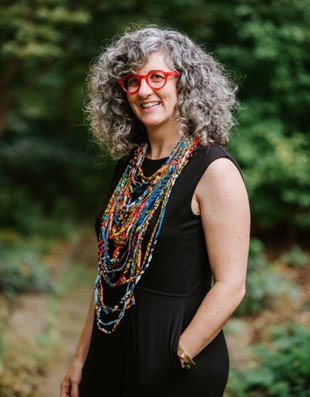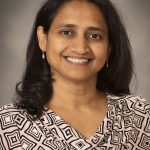An Interview with Hale Ann Tufan: Passion for More Inclusive Research Space in Agriculture
 Hale Ann Tufan (X: @HaleAnnTufan) is an associate professor at the School of Integrative Plant Sciences at Cornell University. Hale works in a highly interdisciplinary field where she explores how agricultural research processes and outputs influence or contribute to social inclusion and gender equality. Hale is also a part of several initiatives, such as Feed the Future Innovation Lab for Crop Improvement and Gender Responsive Researchers Equipped for Agricultural Transformation, focusing on improving gender equality in agricultural research.
Hale Ann Tufan (X: @HaleAnnTufan) is an associate professor at the School of Integrative Plant Sciences at Cornell University. Hale works in a highly interdisciplinary field where she explores how agricultural research processes and outputs influence or contribute to social inclusion and gender equality. Hale is also a part of several initiatives, such as Feed the Future Innovation Lab for Crop Improvement and Gender Responsive Researchers Equipped for Agricultural Transformation, focusing on improving gender equality in agricultural research.
Can you tell us a little bit about yourself?
My name is Hale Ann Tufan (she/her), and I am an associate professor at the School of Integrative Plant Sciences at Cornell University. I entered the tenure track last year, and before that, I spent around 10 years doing international agriculture research as a program director at Cornell University. I received my PhD from John Innes Center in the UK, working on molecular plant-pathogen interactions. After my PhD, I briefly worked with CIMMYT in Turkey in the winter wheat breeding program.
I am from Turkey, and I grew up in Turkish-American mixed household. I consider myself a third-culture child who grew up in a mixed culture, and I carry that with me most places I go.
What are your research interests?
My research interest is around gender equality and social inclusion in agricultural research. I focus on global crop improvement; therefore, most of my work is international. I hesitate to call it my research because it is very collaborative. We use participatory research practices and use a lot of reflectivity, collective creation, and design as research approaches. Our work spans from supporting breeding programs to helping them design and implement research that uncovers social heterogeneity, mainly targeting women and other marginalized farmers. We also work on method development to develop new research approaches and tools. I am also interested in research that takes a more critical look into research practices and cultures in agriculture.
Who is Hale Ann Tufan outside of the job? What do you like to do in your free time?
I have two young children and try to be an involved parent; therefore, most of my non-work time is spent with my kids. I invest time trying to be healthy and engage in activities like yoga, running, exercising, and socializing. I also developed a deep connection with my garden in recent years; I spent a lot of time in the garden as a form of therapy and me-time.
How did you become interested in plant science? What does your career path look like?
My career path was quite indirect. I started my science career as a pre-vet undergrad at Colorado State University. While doing lab work in my pre-vet program, I realized working with plants was better for me. During my master’s and PhD, I performed a lot of applied work and molecular biology on wheat-fungal pathogen interactions. The time spent in the lab made me realize that I was not a lab scientist. I always loved interacting with people and doing international work, so I wanted to switch gears. The transition between my PhD and finding the position at Cornell was quite challenging. It took time to find the right steps for the transition, where I want to go, and how to get there.
How did you become interested in gender equality in agriculture? Most importantly, how did you create opportunities to pursue research in this field?
I followed my passion. Even though it is a hard path, it was important for me to follow my passion and do what gets me up in the morning. While working at CIMMYT, I realized I was more interested in working with women farmers and understanding their experience than the breeding program itself. Thinking about my experience as a young woman researcher and other researchers, I decided that I prefer to devote my career to moving the needle in gender equality in agriculture. I describe myself as a feminist and deeply care about women’s rights. I realized that my personal and professional views could merge, allowing me to do this work.
When it comes to creating opportunities, I was lucky to be in the right place at the right time. I tried to enlarge my network quite a bit and listened a lot to understand what others do and care about. In this way, we created opportunities together. Putting yourself out there and showing up is important because you learn something from those interactions. I set myself knowing that this would be uncomfortable and tough, but that was the only way to get there. If one is interested in doing interdisciplinary work, it is essential to take the time to think about what other people do and how they see the world to build a joint understanding of where we want to go together. Once you have a well-functioning group, the ideas generate themselves.
What do you think about current gender distribution in plant science and agriculture? What do you think we can do better for more of a gender-equal future in agriculture and plant science?
Looking at the data regarding gender distribution in these fields, we still have a long journey to go. This is more accepted in the international setting; there is no question that we still have a problem with gender equality in agriculture and plant sciences. We can start doing better by admitting we still have a way to go. We should not only focus on the numbers but also on the experiences of individuals. The question of “why” is crucial. Why do people leave or do not enter these fields? Understanding the “why” is more work, but we must answer the why to change how we operate and eventually change the cultures.
Aside from your job at Cornell, you are also a part of great initiatives like Feed the Future and GREAT. How did you get involved in these initiatives? Do you have any suggestions for younger generations who want to pursue careers in similar initiatives?
It is difficult to formulate a recipe. I got lucky to have people supporting me and tuning me into opportunities. Research also suggests that mentoring is very critical when it comes to mentee success, which was the case for me.
Cultivating relationships is also critical, finding the right collaborators and colleagues who you feel supported by and share common values and research interests.
My suggestion for younger generations would be to look beyond the research to select the right team to work with because teams can make or break the experience of research. Research is not generated in a vacuum but socially generated and experienced. Finding a team that is inclusive and collaborative and finding people who you want to have a relationship with is very important. And this means not necessarily going after fame but finding the people you feel comfortable with.
What do you think are the most challenging aspects of your job? Did these challenges ever make you consider leaving academia or research?
The most challenging part of what I do is not fitting in a box. People need to label you to understand you, and doing interdisciplinary work is an exciting and challenging space. Disciplinary ambiguity is not common in academia, and being outside of that is challenging.
My working relationships and research keep me going in my work. Everybody wants to leave academia at some point, and normalizing and talking about this feeling is so important, especially why are made to feel it. Research suggests that women may leave academia due to feelings of isolation, fear of failure, and imposter syndrome, amongst other factors. These feelings are very ubiquitous, and everyone experiences them. There is comfort in knowing that you are not alone, and can talk about these with others. We should also remember that leaving academia or a research career is a great path if it is the right thing to do for the person and they chose it. However, if you are made to leave because of negative experiences and work environment, it is a different problem that is more common.
You mentioned that you have two young children. How do you find a balance between being a researcher and a parent? Do you have any advice for younger generations on a similar path?
I start every day with a “you can expect anything” attitude. I let go of predictability and routine, which is tough if you are used to controlling your time. My advice for researcher parents is to let go of the guilt. I think the guilt is the most detrimental to me. If I feel guilty about leaving work early due to my parenting responsibilities, I cannot be present with my kids fully, and it goes the other way around. There is a constant guilt that we are conditioned, and it is the worst thing you can do to yourself. You cannot be a good parent or a good researcher if you have constant guilt. Also, I see myself as a role model for my kids, who are growing up watching me do what I love. I try to remind myself of that when I spend more time at work sometimes.
What message would you like to share with future plant scientists?
The times that I have been happy as a researcher when I do what I love and feel I belong in a group working together. My suggestion would be to find a space where you feel you belong and you can thrive, even if that is not what is the immediately obvious path. Everyone belongs to this field, whether it sometimes does not feel like that or not. If you believe this is what you love and want to do, hang onto that.
______________________________________________
About the Authors
Burcu Alptekin is a postdoctoral researcher at the University of Wisconsin-Madison. Her research aims to improve the abiotic stress tolerance of modern-day crops through omics, molecular genetics, and beneficial plant-microbe interactions. As a first-generation, international woman scientist, Burcu is committed to increasing the representation of women in plant science. She is an early career representative at the Women in Plant Science Committee of ASPB. You can find her on X: @burcuplants.
Maryam Rahmati Ishka is a Postdoctoral Researcher at Julkowska lab at Boyce Thompson Institute, where her research focus is on the plant architecture and stress resilience. Maryam received her Ph.D. from the University of Nevada, Reno, where she investigated the genetic components of calcium circuits in Arabidopsis vegetative and reproductive development at Harper lab. Maryam served two years as an Assistant Features Editor for The Plant Cell and as an Early Career Representative on the “Women in Plant Biology” committee of the ASPB. Maryam’s overarching goal is to enhance the accessibility of the field of plant science to individuals from diverse backgrounds and with varying perspectives.



